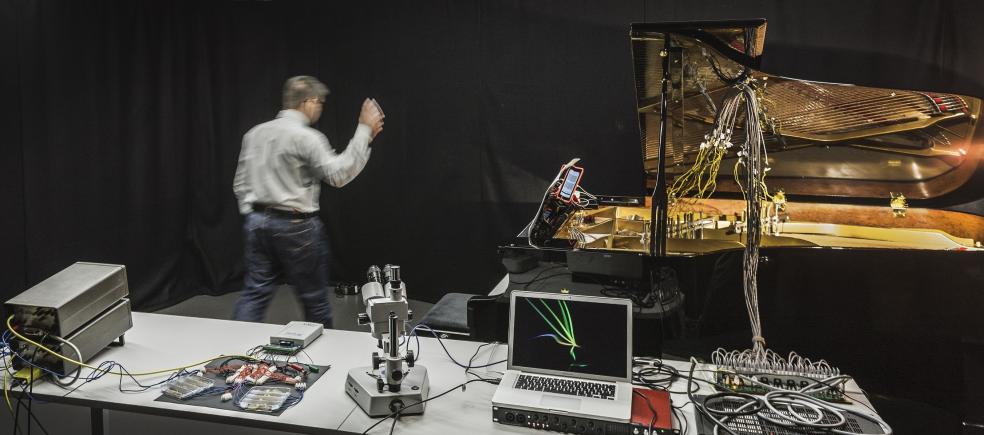
Science and music combine for music festival
A biocomputer that can play the piano and an audio-visual representation of Motor Neurone Disease will be among the highlights of the 10th annual Peninsula Arts Contemporary Music Festival.
Being staged at Plymouth University from 27 February to 01 March 2015, the festival celebrates experimental music with the programme responding to advances in science and computer technology that are changing the way we understand, listen to, play and perform music.
Curated by directors Simon Ible and Professor Eduardo Reck Miranda, it encompasses classical and electronic music, film and installation, and experiments and discussions. And as the musicians venture into the unknown, audiences are encouraged to actively listen and engage in debate about what they hear, see and feel.
The theme for the 2015 festival is Biomusic, with composers and artists exploring new sounds, ideas, instruments and musical structures inspired, and even created, by biological processes. Highlights include:
Biocomputer Music by Eduardo Reck Miranda – an unprecedented piano duet played between the composer and a biocomputer, which harnesses the ability of slime mould to perform computational tasks;
Piano:Forest, by Mike McInerney – a performance for piano and live data creating a musical ecosystem using data derived from the UK’s forested landscapes;
Orchestral Processing Unit, by Alexis Kirke – will see musicians act as biological processing elements in a ‘computer’ whose calculations are made through music. People will take the place of the metallic elements that make up ‘silicon chips’ and musical melodies the place of the electrical currents which flow between elements as processing is done;
Unfolding | Clusters by Federico Visi, Giovanni Dothel and Duncan Williams – an immersive audio-visual installation which narrates the biomolecular deterioration of neurones in the devastating Motor Neurone Disease;
Corpus Callosum by Eduardo Reck Miranda – a chamber orchestra will recreate the dialogue between the right and left hemispheres of the brain in a score created from an fMRI scan of the composer’s brain listening to Beethoven’s 7th Symphony;
Fast Travel, by Alexis Kirke – a musical composition modelled on the evolution of humpback whale song.
Simon Ible, Director of Music for Peninsula Arts, says: “After 10 years, the Peninsula Arts Contemporary Music Festival remains a unique platform for contemporary science and music to come together.
From a building that can play a sunlight symphony to the world’s first brain-computer music quartet, the festival has always balanced the cutting edge of musical research with creative innovation. We’re thrilled to present Biomusic as the next stage in this evolution.”
Eduardo Reck Miranda, Professor of Computer Music and director of the Interdisciplinary Centre for Computer Music Research (ICCMR) at Plymouth University, added: “Over the years, our research has led to many performances which the audience are directly involved, and they have in several instances been premiered at the Peninsula Arts Contemporary Music Festival. Music is something everyone can relate to, but our work has also shown that it can have amazing and positive impacts on those with the most serious of neurological conditions, as well as presenting their effects in new and innovative ways.”
Peninsula Arts is the public arts and culture programme of Plymouth University and the Contemporary Music Festival is promoted in partnership with the ICCMR. This department, which explores the meeting point of music, neuroscience and artificial intelligence, will demonstrate its pioneering research into music and the brain through the festival’s opening symposium and a series of composed performance experiments.
Many of the events featuring in the Peninsula Arts Contemporary Music Festival are free and for more information about the Festival, visit www.peninsula-arts.co.uk.










